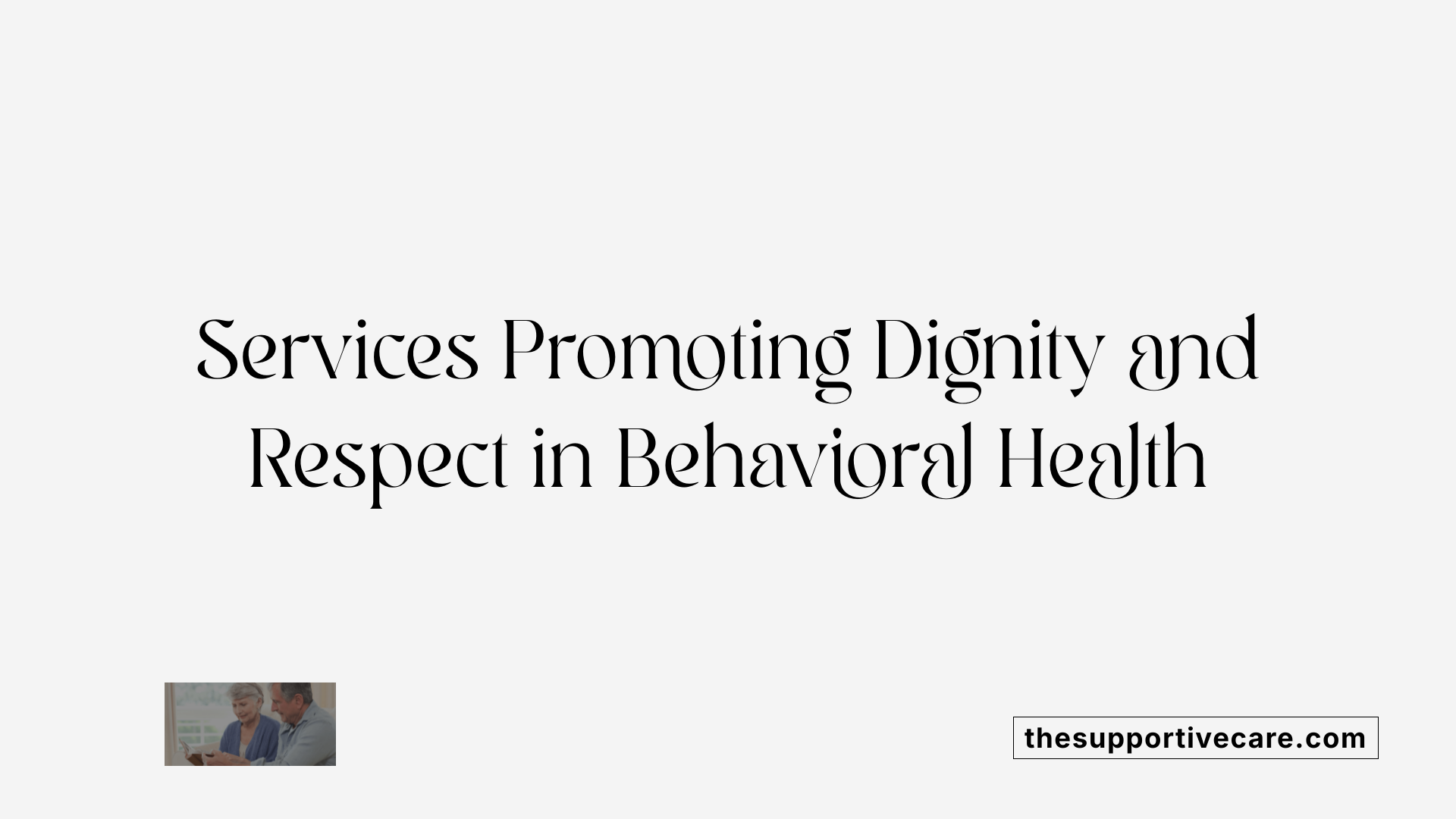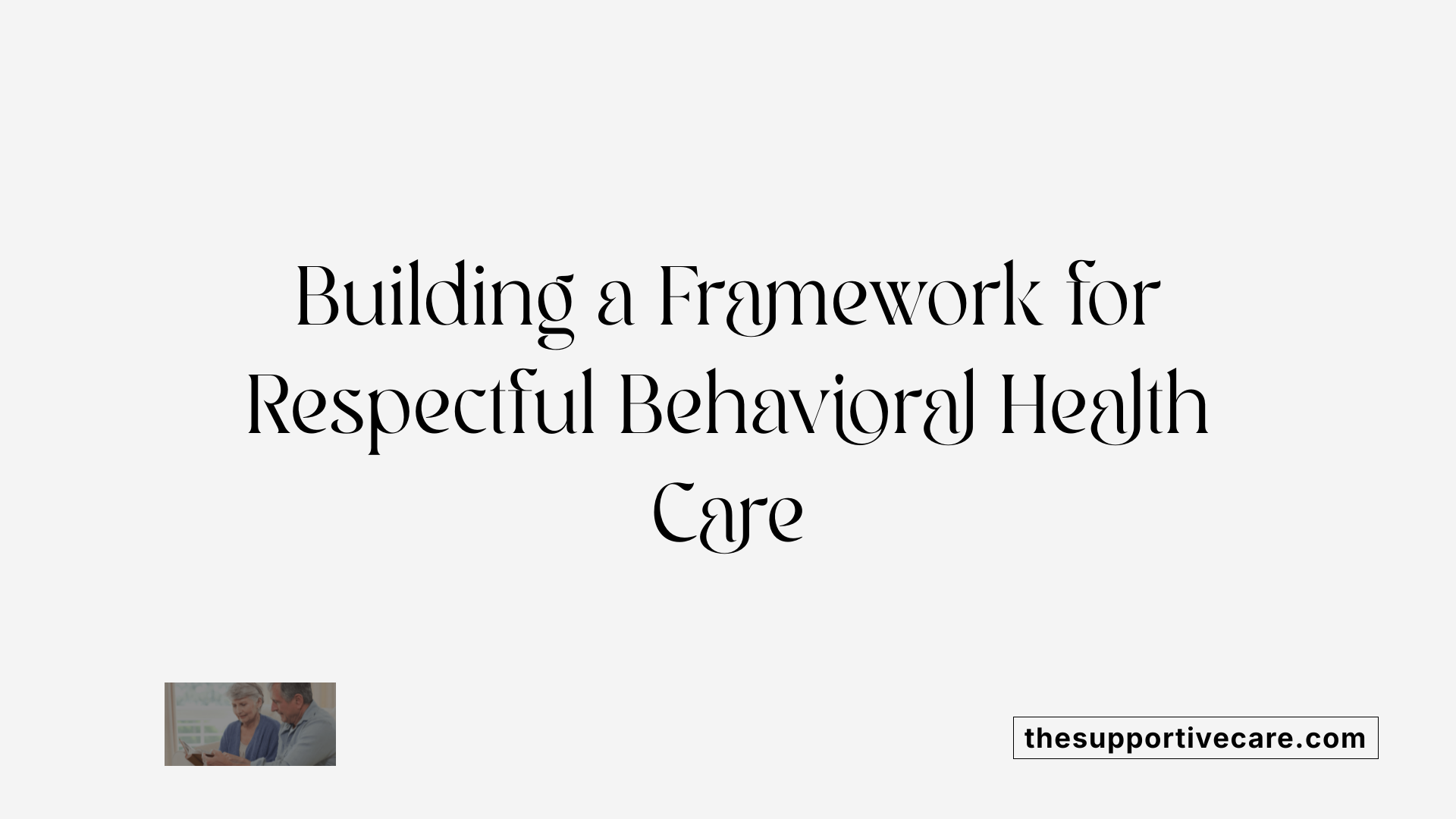The Central Role of Dignity and Respect in Mental Health Services
In recent years, the recognition of dignity and respect as fundamental principles in behavioral health services has become increasingly prominent. These qualities are essential for fostering effective, compassionate, and ethically sound care. This article explores how behavioral health services around the world, including organizations like Banyan Community Health, Thriving Mind South Florida, and Advance Health and Community Services (AHCS), prioritize dignity and respect through core principles, policies, and innovative practices that enhance patient outcomes and uphold human rights.
Foundations of Dignity and Respect in Behavioral Health
Why are principles like compassion and autonomy important in behavioral health services?
Principles such as compassion and autonomy are fundamental in delivering respectful and effective behavioral health care. Compassion involves understanding, kindness, and genuine concern for patients’ suffering, helping to build trust and emotional safety. It encourages a supportive environment where patients feel valued and understood, which can facilitate openness and cooperation.
Autonomy, on the other hand, empowers patients by respecting their right to make informed decisions about their treatment. This fosters a sense of control and self-worth, essential for recovery and engagement in care. Respecting autonomy involves transparent communication about risks, benefits, and alternatives, and honoring patients’ choices, including the right to refuse or modify treatment.
Together, these principles promote a person-centered approach that respects individual dignity, improves satisfaction, and leads to better health outcomes. Embedding compassion and autonomy into practice creates a trusting, ethical relationship that supports the psychological well-being of patients and enhances the quality of behavioral health services.
Implementing Respectful and Compassionate Care Practices
 Promoting respectful treatment and safeguarding patient rights is fundamental in behavioral health services. Healthcare organizations can develop clear policies that emphasize dignity, privacy, and autonomy, ensuring all patients are treated with fairness and respect. These policies should be regularly reviewed and updated, incorporating feedback from patients and staff to foster a culture of continuous improvement.
Promoting respectful treatment and safeguarding patient rights is fundamental in behavioral health services. Healthcare organizations can develop clear policies that emphasize dignity, privacy, and autonomy, ensuring all patients are treated with fairness and respect. These policies should be regularly reviewed and updated, incorporating feedback from patients and staff to foster a culture of continuous improvement.
Applying trauma-informed, culturally responsive, and person-centered approaches enhances care quality. Trauma-informed care recognizes the widespread impact of trauma and emphasizes safety, choice, and empowerment. Culturally responsive practices acknowledge diverse cultural beliefs, values, and definitions of dignity, ensuring respectful communication and interventions that resonate with each individual.
Effective communication is vital for reinforcing dignity. Using respectful language, maintaining eye contact, listening actively, and providing clear information help build trust. Maintaining stringent privacy measures and confidentiality also reinforce patient trust and safety. Safeguarding protected health information, ensuring private settings for sensitive discussions, and obtaining informed consent are essential steps.
Systemic collaboration among multidisciplinary teams, community partners, and policymakers plays a crucial role. Integration of services across healthcare providers ensures continuity of care and addresses the complex needs of behavioral health patients. Community engagement and supportive policies foster environments where dignity is prioritized and human rights are protected.
| Strategy | Description | Impact |
|---|---|---|
| Policies promoting dignity | Develop and regularly review treatment policies | Ensures respectful, ethical care |
| Trauma-informed care | Recognize trauma and respond with safety and empathy | Reduces re-traumatization |
| Culturally responsive practices | Tailor care to diverse cultural backgrounds | Respects individual identities |
| Effective communication | Use respectful language and active listening | Builds trust and understanding |
| Privacy and confidentiality | Safeguard health information and private discussions | Reinforces safety and trust |
| Multidisciplinary collaboration | Coordinate with community and health partners | Enhances comprehensive care |
By implementing these practices, healthcare providers can foster environments where patients feel valued, understood, and empowered to participate actively in their recovery journey.
Types of Services that Emphasize Dignity and Respect

What types of behavioral health services focus on promoting dignity and respect?
A wide range of behavioral health services are designed to uphold the principles of dignity and respect for every individual. Counseling, psychotherapy, peer support programs, and outreach initiatives form the cornerstone of these approaches.
Counseling and psychotherapy, including evidence-based modalities like cognitive-behavioral therapy (CBT), dialectical behavior therapy (DBT), and trauma-focused therapies, are tailored to meet personal needs while prioritizing respect and understanding. These therapies emphasize active listening, validation, and empowering patients to take an active role in their recovery.
Peer support programs are integral in fostering a respectful environment. Peer specialists, who have lived experience, offer empathy, hope, and reassurance, helping others feel seen and valued. Similarly, pastoral counselors and holistic approaches incorporate spiritual and emotional insights, supporting overall well-being.
Mental health services are increasingly tailored for diverse populations, including multilingual and culturally competent care. This ensures respect for different cultural norms, values, and beliefs, which is crucial in maintaining dignity across varied communities.
Ultimately, these services aim to empower individuals through compassionate, respectful interactions, reinforcing their inherent worth while promoting recovery and well-being.
The Role of Policies, Frameworks, and Community Initiatives

What policies and frameworks support respectful behavioral health treatment?
Supporting respectful care in behavioral health relies on various policies and frameworks designed to uphold patients' rights and dignity. Laws safeguarding confidentiality, informed consent, and ethical standards set the foundation for respectful treatment. For example, regulations that protect patient privacy ensure trust and safety in health services.
In addition, integrating mental health services within primary care settings through models such as Primary Care Behavioral Health (PCBH) and Collaborative Care promotes a holistic, patient-centered approach. These models foster coordination among providers, reduce stigma, and enhance accessibility.
Mental health parity laws play a vital role by ensuring that insurance coverage for mental health disorders is comparable to physical health, removing financial barriers that can undermine dignity and access. Early intervention programs and community outreach efforts serve to identify issues promptly, offering culturally sensitive support that respects individual backgrounds.
Government and non-government initiatives further reinforce these frameworks. For instance, the World Health Organization’s (WHO) Quality Rights project emphasizes promoting social justice, human rights, and autonomy for people with mental health conditions. Such initiatives advocate for community-based approaches, peer support, and crisis response systems, including national helplines and mobile response teams.
Workforce development, expansion of telehealth services, and community engagement strategies shape a comprehensive network that values every individual’s dignity. Frameworks like the IAP2 Spectrum guide stakeholder engagement, ensuring that community voices influence policy and service delivery.
Collectively, these policies and frameworks foster a respectful, inclusive, and effective environment where individuals seeking behavioral health support are treated with dignity, respect, and compassion.
Advancing a Culture of Respect: Training, Leadership, and Community Engagement

What strategies can healthcare providers use to deliver respectful and compassionate behavioral health care?
Delivering respectful and compassionate behavioral health services requires a multifaceted approach that emphasizes empathy, understanding, and cultural awareness. Healthcare providers can focus on creating a culture grounded in kindness and respect, which encourages trust and fosters effective treatment outcomes.
One of the most effective strategies involves comprehensive training programs. These programs should enhance providers' skills in active listening, empathy, and cultural competence. For example, understanding patients' backgrounds, beliefs, and social contexts helps tailor care that resonates with their values and needs.
Incorporating person-centered practices like motivational interviewing, trauma-informed care, and early intervention approaches ensures support is personalized and effective. These methods recognize individual experiences and promote autonomy, dignity, and recovery.
Leadership plays a crucial role in cultivating a respectful environment. Leaders must model compassionate behavior, establish policies that uphold ethical standards, and address systemic challenges such as staff burnout or high workload that can hinder respectful interactions.
Engaging patients and their families in decision-making processes also strengthens trust and promotes dignity. Clear, empathetic communication, and involving patients in their care plans foster collaboration and empowerment.
Community engagement initiatives are vital to extending respectful care beyond clinical settings. Partnerships with local schools, public health agencies, and community organizations help improve outreach, reduce stigma, and increase access to culturally appropriate services.
Finally, addressing systemic barriers—like disparities in access to care and workforce shortages—ensures a sustainable environment where respectful treatment is standard. Promoting workforce well-being through ongoing training, support, and recognition helps maintain a compassionate, competent behavioral health workforce dedicated to upholding dignity for all patients.
By integrating these strategies, healthcare providers can foster a respectful, inclusive culture that improves patient experiences and outcomes across the behavioral health spectrum.
Fostering a Future of Compassionate Mental Health Care
Promoting dignity and respect in behavioral health services is not merely an ethical obligation but a cornerstone of effective, person-centered, and recovery-oriented care. Through a combination of compassionate policies, culturally responsive practices, community partnerships, and committed leadership, organizations can create environments where every individual feels valued, understood, and empowered. As global standards evolve and awareness increases, the continued integration of dignity into mental health care will underpin efforts to reduce stigma, promote social justice, and ensure equitable access to quality services for all.
References
- Mental Health Services in Miami-Dade & Broward County
- Free Mental Health Services | Miami | South Florida | Thriving ...
- Behavioral Health
- Behavioral health | Dignity Health Medical Foundation
- Promoting Patient Dignity in Healthcare
- Dignity- a fundamental principle of mental health care - PMC
- Advance Health and Community Services
- Types of Mental Health Professionals
- Behavioral Therapy - StatPearls
- Behavioral and Mental Health Services


































































































